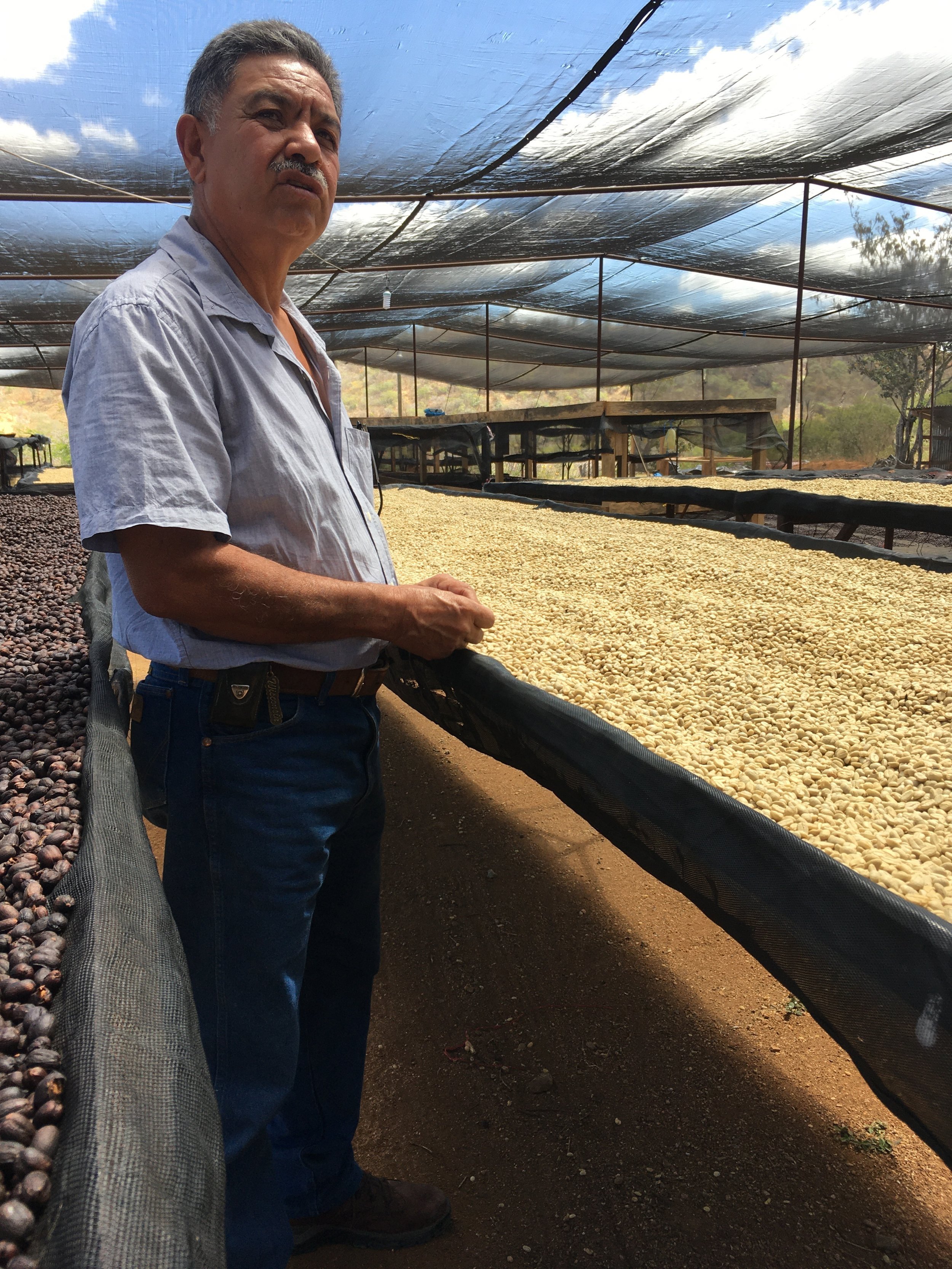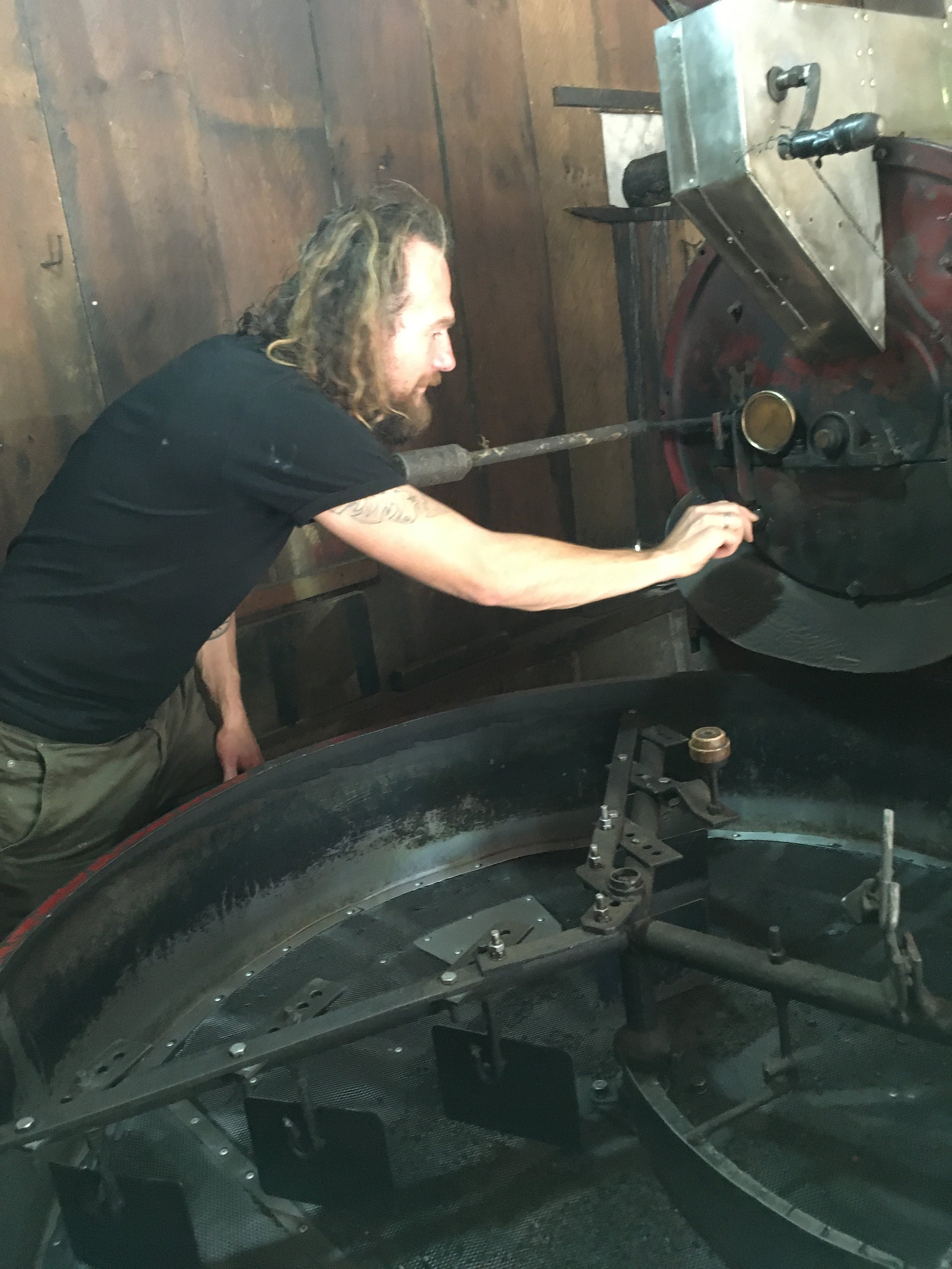In 2016 our then-partner in Nicaragua, Francisco, stole money from over 16 coffee producers, their families, us, and our partner and social lender. Of the 16 farmers we worked with, most returned to conventional coffee. However, a small group kept working with quality and is now proving strong and united. This year we traveled to Nicaragua to see how we can work directly again with this outstanding group.
Luis, at La Dueña DryMill
Luis Armendariz leans softly on the rising beds of La Dueña drymill, on the outskirts of Ocototal, as he explains how these past years have led them to seek their own independence as a group of farmers. His two adult daughters, Benhazin and Arianova, and his partners and lifelong friends, Moncho, his son Juan Ramon, and Bayron, stand forming a circle around him and we listen. Luis still takes his old military stance, and his words come out with the sensible authority of someone not only speaking for himself: "After what happened, some unhappy producers decided to take the path of conventional coffee,” he says, “but we knew we had the potential. Historically, our coffee has been recognized for its quality, and great coffees have come from this region. This is the direct result of the care we give to production. So we took the initiative and came together as a group. We have the human capacity and our children are on board. They are already part of our value chain. We've always believed that the future of coffee is in its quality and its varieties. We decided to stay together and kept on working."
Luis refers to the scam as "that which happened" others say "After the troubles” “or “that thing that happened”. “After the troubles” says Bayron “my family and I were thrown into debt, and this destroyed my trust”. “After the revolt, my family lost everything," says Ronny, whom we met on our last day, and whose father was Francisco's ally when he stole money and resources–as well as two years of the producers’ output. He is taking charge of the debts owed to the farmers. Francisco fled. Some say he is in the US, but we cannot be sure. We do know, however, that he left behind a group of unhappy producers and a big debt.
“It’s happened before. People have stolen entire containers, so it’s understandable why we have so many trust issues and why direct trade is so relevant for us.”
So far, La Dueña doesn't have an export license, but the group intends to obtain one. Arianova, Luis's daughter, works in exporting, so her role with the group is quite clear. "Once we have this, it will all stay among us," says Moncho, the owner of La Dueña. As we stand there, listening to them speak, Luis occasionally runs his hands through the coffee beans scattered on the raised beds, pops one open, chews, and keeps talking. "Our dream is to work directly," says Moncho "it would be a dream come true."
Lennart testing Byron’s roasting machine.
Soon after, we are in the back of Bayron's truck and heading to Nueva Segovia, which is right on the border with Honduras and is home for most of them. Bayron moves with the energetic drive of someone that knows exactly what to say or do. His smile shines in his eyes as he looks at Lennart, sitting next to him in the Toyota. "I'm so happy you're here," "estoy alegre" he repeatedly says, "we didn't think you’d be back." These years have made Bayron a much stronger man. "I've learned not to trust anyone until I have the contract in my hands," he says, and off we go in the Toyota, bouncing slightly. He drives fast, and I can feel the excitement and nervousness that our visit is stirring up. Bayron is not only a coffee grower. He is a self-taught mechanic and has applied his genius to coffee. He rebuilt his 1976 Toyota truck. He built his family washing station and now makes roasting machines from scratch. "I love doing this," he says, "I have so much fun." Besides this, he also roasts, grinds and packs the coffee his neighbors send him. He lives with his wife and two girls. His brothers and father live nearby in the house that saw him grow up. "I feel strong again and ready to regain my market," he says as we lurch over the bumps in the dirt road and reach his father's house.
Byron, at his estate El Mirador.
Our days are full in Nicaragua. We haven't stopped for a second. There is so much to see and discover, and the paths open upon us like a strange exotic flower. Each turn we take on the road reveals a contrasting sight. Rivers that perpetually shine move along with us as loyal witnesses, sometimes from afar, so they can only be heard. The ecosystem changes and it's always dense vegetation. Ancient ferns, trees of all sizes and colors, blossoming flowers, and a wide diversity of birds fly here and there. It smells like caramel, banana, and rotting mucilage. "Do you smell that?" asks Arlin, on our second day in the country as she shows us her beautiful estate up in Jinotega.
Mother of two, Arlin also has a full-time job and does coffee on the side. "Since I was little, I wanted to become a coffee producer," she says. But it was not until four years ago that she took the challenge seriously. Now she couldn't be happier. "I love coffee. I love it. I drink 14 cups a day and am perpetually in love with the process."
We met Arlin through our now trusted partner in Nicaragua, René, who also helped Arlin improve her processing, and they appear to be close friends. As the owner and manager of four estates and a drymill in the politically challenging nation of Nicaragua, René has persevered in what seems to be a divided and intensely competitive scenario. Son of Don René Paguagua, now 94, he has been in coffee all his life. More than this, coffee is what has made him.
And it is at Santa Lucila where we finally meet Ronny, 32. His father, Ronny Sr., was left to face the immense debt Francisco left behind after he ran away. The man lives from the money his two other sons send from the States, but Ronny Jr. doesn't feel like migrating. He felt like staying, clearing his father's debt and working with coffee. This year, we're honored to offer his coffee. Over the past years, his production has dropped dramatically, and he is in so much debt he sometimes struggles to meet his daily needs: "But I don't like living in the city. I like life in the field." He says with the clear straightforwardness of someone that means it.



